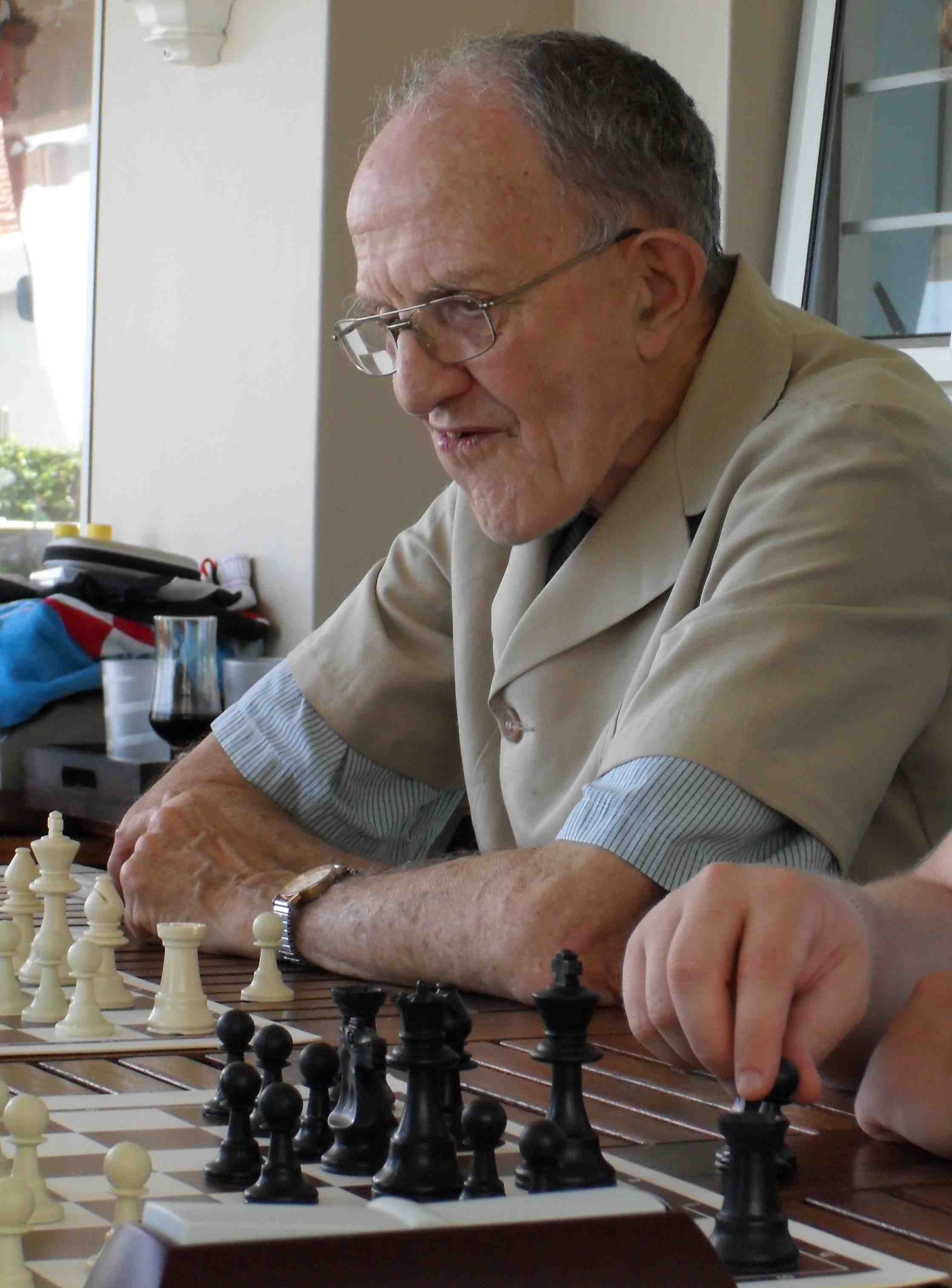
John Blackburn (photo 2009)

John was born in Southampton, England in early 1933. His mother's maiden name was Trevail,
an unusual surname of Cornish origins, so his birth is easy to find in the index. In 1946,
after the Second World War, the Blackburn family immigrated to South Africa. John matriculated
from Durban High School and went on to study chemistry. He worked as an industrial chemist
at Lever Brothers for many years. John joined the Durban Chess Club in 1952 and was a member
of the Club for 62 years, which must surely be a record. He played 29 times in the A section
of the club championships and became Durban champion for the first time in 1956, after narrowly
missing out in 1955 (John lost a playoff match to Moss Kolnik). In all, he won the title on
seven occasions, with his last win being in 1980.
John was also well known as a bridge player and music afficionado. He was a regular tournament
player until the mid-1980's, after which he only played occasionally. Nevertheless, he remained
a formidable opponent. When the club was in difficulties around the turn of the millenium,
John returned to play in tournaments for a few years and was one of a small group of players
that succeeded in reviving the club.
Club chairman Peter Dankelmann wrote: "I did not know him when he was at the peak of his
strength, but he must have been a fearsome opponent. Even decades after his greatest successes,
there was nobody in the club who could expect a safe victory from a game with John Blackburn.
He was also a man of great integrity. I remember him speaking up when he felt that he
should be placed in the A-section of the Club Championships, and a few years later
speaking up again when he felt he shouldn't. John was the kind of person whom you could
trust with your life, uncompromisingly honest and reliable. Just over a decade
ago, when the club was in grave danger of going under, John was one of the members
who gave it their unconditional support to help bring it back to life".
John had a classical style of play, invariably defending with the classic symmetrical lines
such as the Slav Defence to the Queens Gambit or the Black side of the Ruy Lopez. With White
he opened with d4 in his later years, after being an e4 player in his earlier career. Having
played through his games, it is clear that John preferred defending to attacking. He liked to
grab any pawn not nailed down, then defend. In many ways he was a follower of Steinitz, leaving
his King in the centre and looking for long-term positional gains. He favoured closed games and
lots of slow manouevring, rather than seeking a quick victory in the opening. John was a very
strong defender, and won many games from horrible looking positions.
John's sister kindly donated a small suitcase labelled "chess games chronological" by John.
It contained hundreds of games recorded in old-fashioned (often ambiguous) descriptive notation.
Transcribing these has taken me many hours, partly because the games up to 1970 were written on
a variety of scraps of paper, rather than in a proper score book - John didn't waste any paper!
The following games file contains
Blackburn games from 1953 to 2009 (994 games/results).
A number of games from the 1950's and also some games from 1991 to 1995 were unable to be found.
Scores of any missing games would be much appreciated. If you played against John, please check
that I have the game score captured correctly!
Here is a selection of games by Blackburn.
Game 1 is in many ways a typical Blackburn game from the 1960's. Isaacson was extremely
successful during his short stay in Durban, losing just one game in the 1963 championship - this
one. John retreats his pieces, Isaacson attacks, and it all goes wrong for him by move 25.
Game 2 is his defeat of GM Karl Robatsch in a 1988 simultaneous display, which I found in Mervyn Millar's
newspaper column of 5 February 1988. The GM was furious, perhaps thinking his opponent should have resigned
around move 26, but he still went on to score +33=4-1 against the club!
Game 3 is a win against Kolnik. John's early record against 10-times champion Moss Kolnik was not very good,
but he caught up a bit in their later games.
Game 4 shows that it was a risky ploy to gambit a pawn against Blackburn. Notice how the white King stays
safely in the centre for the entire game!